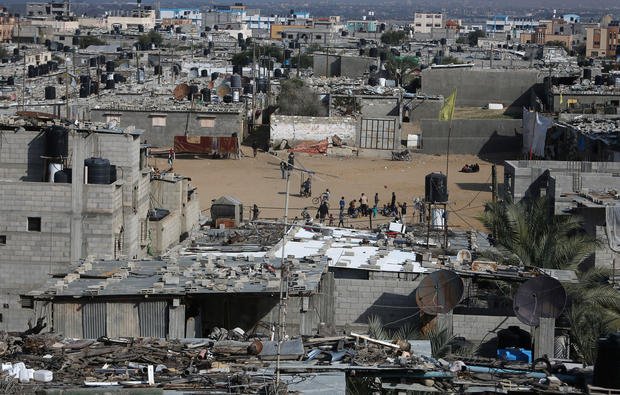JERUSALEM — Palestinian officials voiced outrage on Wednesday over President Donald Trump’s threat to cut funding to the Palestinian Authority, calling his tweets “blackmail” in the aftermath of the U.S. administration’s recognition of Jerusalem as Israel’s capital.
Palestinian President Mahmoud Abbas’s office rebuffed the U.S. leader’s remarks, saying that “Jerusalem is not for sale, neither for gold nor silver.”
Abbas’ spokesman Nabil Abu Rdeneh said that “if the United States is keen on its interests in the Middle East, it must implement the international resolutions which call for a state on the 1967 borders with East Jerusalem as its capital.”
“Without this, the United States will push the region to the abyss,” Abu Rdeneh added.
Mr. Trump expressed frustration on Tuesday over the lack of progress in his attempts to broker peace between Israel and the Palestinians, and pointed his finger at the Palestinians.
“We pay the Palestinians HUNDREDS OF MILLIONS OF DOLLARS a year and get no appreciation or respect,” he tweeted. “But with the Palestinians no longer willing to talk peace, why should we make any of these massive future payments to them?”
Mr. Trump upset the Palestinians last month by recognizing Jerusalem as Israel’s capital and announcing plans to move the U.S. Embassy to the holy city. The Palestinians, who claim Israeli-annexed east Jerusalem as their capital, accused Mr. Trump of siding with Israel on the most sensitive issue in the conflict and subsequently said the U.S. could no longer serve as a mediator.
International support for the Palestinians increased sharply after the creation of the Palestinian Authority in 1994, an autonomy government that was meant to last for five years as a prelude to a final peace deal. But negotiations have repeatedly sputtered, and the Palestinian Authority has become a permanent fixture, propped up by billions in international aid to prevent a humanitarian crisis in the Palestinian territories.
The U.S., as one of the largest donors to the Palestinians, could inflict great pain on the Palestinians by cutting off aid. Yet it could also have a negative effect on Israel, which also relies on the Palestinian Authority to help maintain calm.
Israel captured the West Bank, Gaza Strip and east Jerusalem — areas claimed by the Palestinians for a future state — in the 1967 Mideast war.
As an occupying power, Israel is formally responsible for the welfare of Palestinians. The existence of the international-funded Palestinian Authority means Israel no longer needs to shoulder that financial burden. Israel also has a security interest in the continued functioning of the authority, since Palestinian security services cooperate with Israel to prevent attacks by Hamas and other militant groups.
The United States has contributed over $5 billion in economic and security aid since the mid-1990s, according to Congressional research figures. Annual economic aid since 2008 has averaged around $400 million, much of it devoted to development projects. Between 2012 and 2016, the United States Agency for International Development provided over $1.7 billion in development and humanitarian aid to the Palestinians, according to the U.S. State Department.
Additionally, the U.S has donated an average of $100 million annually to Abbas’s security services — and cutting that funding could prove disastrous for Israel.

A view shows houses of Palestinians in Khan Younis refugee camp in the southern Gaza Strip January 3, 2018.
REUTERS
The World Bank says there is currently no feasible alternative to aid as budget support to the Palestinian Authority, given the poor state of the Palestinian economy. It blames Israeli restrictions in the West Bank and Gaza, as well as a continued rift between the PA and the Hamas rulers in the Gaza Strip for the economic troubles.
Senior Palestinian official Hanan Ashrawi said the Palestinians “will not be blackmailed” by the president, adding that Mr. Trump “singlehandedly destroyed the very foundations of peace” by recognizing Jerusalem as Israel’s capital last month.
“Trump has sabotaged our search for peace, freedom and justice,” she said Wednesday.
American officials have been weighing possible retaliatory actions against the Palestinians for a U.N. resolution condemning Mr. Trump’s Jerusalem decision. The resolution passed last month by a 128-9 margin.
U.S. Ambassador to the United Nations Nikki Haley presaged Mr. Trump’s threat on Tuesday, saying the president doesn’t want to give more funds “until the Palestinians are willing to come back to the negotiation table.”
“We still very much want to have a peace process. Nothing changes with that. The Palestinians now have to show they want to come to the table,” Haley said. “As of now, they’re not coming to the table, but they ask for aid. We’re not giving the aid. We’re going to make sure that they come to the table.”
In addition to its support for the Palestinian Authority, the U.S. is also the largest donor UNRWA, the U.N. agency that assists Palestinian refugees.
The U.S. donated $355 million to UNRWA in 2016, nearly 30 percent of its total funding. A large portion of the organization’s activity is focused on providing health care, education and food aid to Palestinians in the West Bank, Gaza Strip, Jordan, Syria and Lebanon. Ending this aid could precipitate a humanitarian crisis, particularly in impoverished Gaza, where a majority of residents are eligible for UNRWA support.
UNRWA spokesman Chris Gunness said it had not been informed of any changes to U.S. funding at this time.
Culture Minister Miri Regev, a senior member of Israeli Prime Minister Benjamin Netanyahu’s Cabinet, said she was “very pleased” by Mr. Trump’s call to cut funding to the Palestinians. She said the Trump administration’s call to cut aid to UNRWA was “correct and important.”
© 2018 CBS Interactive Inc. All Rights Reserved. This material may not be published, broadcast, rewritten, or redistributed. The Associated Press contributed to this report.

